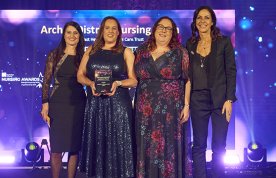Related articles
Julie Roye’s drive and commitment to break down health inequalities and improve access to care...
The Arches team, winners of the Patient’s Choice award at the RCN Nursing Awards 2023, helped...
The RCN Nursing Awards 2023 Greener Nursing Practice award winner shares her tips for a successful...
Julie Roye of East London NHS Foundation Trust used co-production and innovative ideas to improve...




